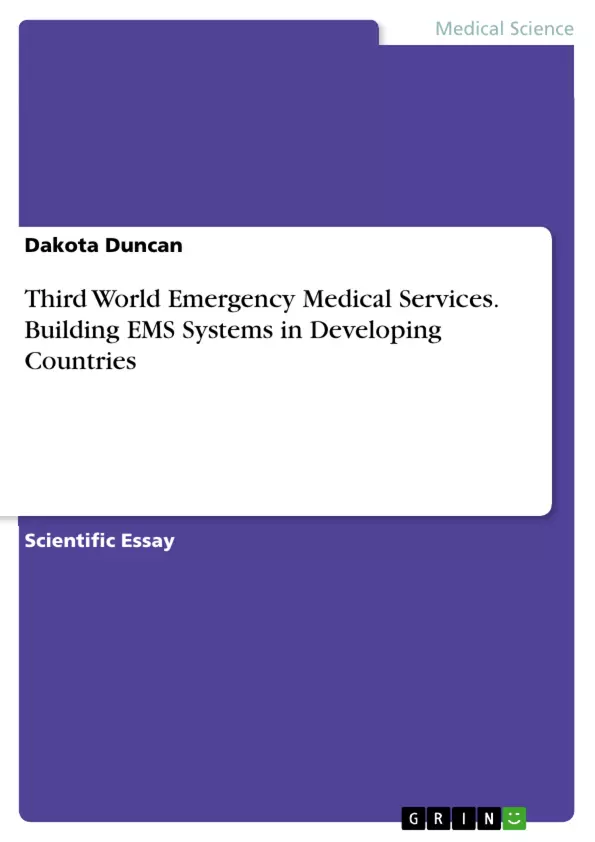How would one go about developing Emergency Medical Service systems in third world nations? Who would tackle the project? Is it even possible with limited resources and logistics capabilities?
This paper outlines all aspects of developing nations and the lack of medical care available, specifically the lack of EMS systems.
Inhaltsverzeichnis (Table of Contents)
- Introduction to pre-hospital systems in developing countries
- Problems associated with the lack of an EMS system
- The necessity of pre-hospital medicine in developing nations
- Benefits of incorporating pre-hospital medicine systems in developing nations
- Opposition to EMS in developing nations.
- Conclusion
- Resources
Zielsetzung und Themenschwerpunkte (Objectives and Key Themes)
This document aims to highlight the importance and necessity of Emergency Medical Services (EMS) systems in developing countries, exploring the challenges and benefits of implementing such systems. It discusses the critical role pre-hospital medicine plays in saving lives and improving healthcare outcomes in resource-limited settings.
- The significance of EMS systems in emergency response and medical care.
- The challenges and limitations associated with the lack of EMS systems in developing countries.
- The potential benefits of implementing EMS systems in improving healthcare outcomes and saving lives.
- The logistical and financial considerations involved in establishing EMS systems in developing countries.
- The impact of EMS systems on the overall healthcare system in developing nations.
Zusammenfassung der Kapitel (Chapter Summaries)
- Introduction to pre-hospital systems in developing countries: This chapter introduces the concept of EMS systems and highlights their critical role in providing emergency medical care. It emphasizes the growing need for EMS systems in developing countries, where access to medical care is often limited.
- Problems associated with the lack of an EMS system: This chapter examines the consequences of lacking an EMS system in developing countries. It discusses the impact on survival rates and highlights the challenges faced by individuals needing emergency medical attention.
- The necessity of pre-hospital medicine in developing nations: This chapter emphasizes the importance of pre-hospital medicine in saving lives and improving the quality of emergency response in developing countries. It highlights the benefits of providing timely and appropriate medical care before reaching a hospital.
- Benefits of incorporating pre-hospital medicine systems in developing nations: This chapter explores the potential benefits of implementing EMS systems in developing countries. It discusses the positive impact on healthcare outcomes, survival rates, and overall quality of life.
Schlüsselwörter (Keywords)
The key focus topics of this document include pre-hospital medicine, Emergency Medical Services (EMS), developing countries, healthcare access, survival rates, logistical challenges, financial considerations, and healthcare improvements.
Frequently Asked Questions
Why are EMS systems critical for developing countries?
EMS systems provide essential pre-hospital care that can significantly reduce mortality rates by ensuring patients receive medical attention before reaching a hospital.
What are the main challenges in building an EMS system in the Third World?
The primary challenges include limited financial resources, logistical hurdles like poor infrastructure, and a lack of trained medical personnel.
What are the benefits of pre-hospital medicine?
It improves survival rates for trauma and acute illnesses, stabilizes patients during transport, and optimizes the use of hospital resources.
Is it possible to implement EMS with limited resources?
The paper explores this possibility, suggesting that with strategic planning and appropriate technology, basic but effective systems can be established.
How does the lack of EMS affect healthcare outcomes?
Without EMS, there is often a significant delay in treatment, leading to preventable deaths and long-term disabilities from treatable conditions.
- Arbeit zitieren
- Dakota Duncan (Autor:in), 2014, Third World Emergency Medical Services. Building EMS Systems in Developing Countries, München, GRIN Verlag, https://www.grin.com/document/310126



